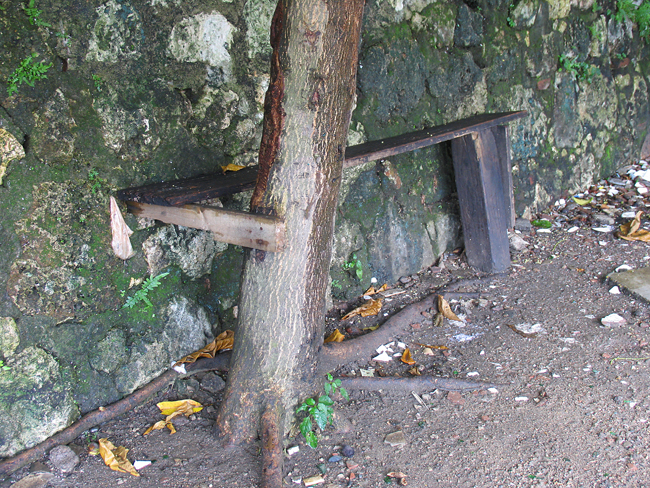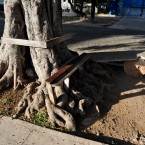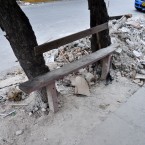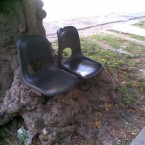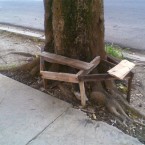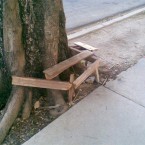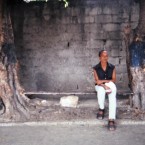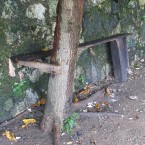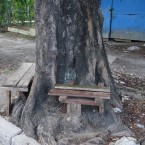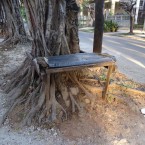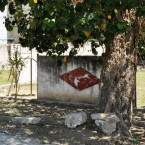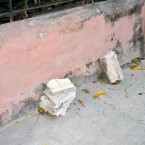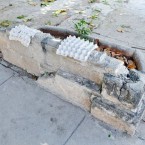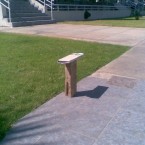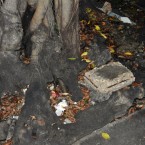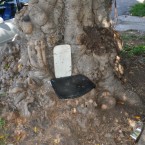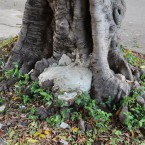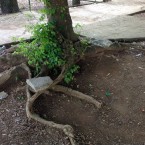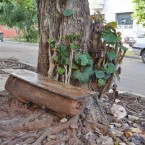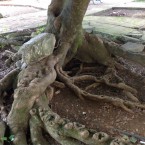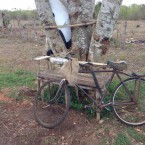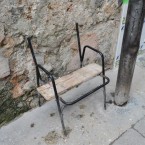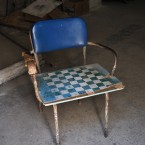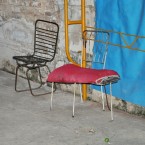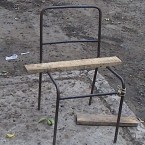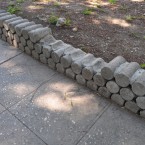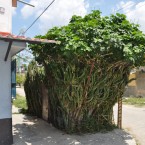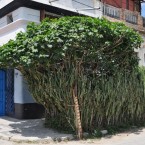Ujamaa*. Inertia of the vine
The Bejuco (climbing woody vine of the tropics) is the son of Dadá. The Bejuco, which has the same engrossed inertia as Kurt Schwitter’s “Merzbau”, is the son of Dada Baldoné, the Yoruba goddess of vegetables. A rural ─and strangely universal─ myth asserts that all the bejucos are only one –an interminable one. It is even said that there is a great circle. Others speak of many “bejucos” forming closed loops, huge plant rings where the logic of the infinite is multiplied. In any case, if you find an end, it means that a circle has been broken.
The persistent and whimsical strength that inhabits the bejuco lies hidden in the city. It animates some bodies, collapses others; it nourishes unexpected flows. The accumulations of wood around some trees in the city come to my mind. The wooden trunk, processed and “shrunken”, returns to its origin. Baldoné, who is bejuco sap and guizazo seeds, shakes the vegetable kingdom, rejects the carpenter’s epiphany: the technological grain and edge. Wood is wood. The movement of the stick in the city makes a loop. From tree to tree, it closes a circle. In the meantime, because that is what Dadá permits, the trunk is subject of labor, time unit, exchange value, subject to rule. Or at least it is ideally that.
There where things cannot be named as Home Legend Honey, Marazzi Imperial Slate, Three Rivers Gold Slate – where Home Depot has not yet arrived – materials are subjugated by the force of need, that latency as powerful as the bejuco, which can contain a coffee field or drown a river.
Ujamaa. Inercia de bejuco
Bejuco es hijo de Dadá. El bejuco, que tiene la misma inercia ensimismada del merzbau de Schwitter es hijo de Dada Baldoné, diosa yoruba de los vegetales. Se afirma en un mito rural y extrañamente universal que todos lo bejucos son uno solo, si encuentras un extremo significa que se ha roto un círculo. Leyendas derivadas aseguran que son muchos los bejucos que se cierran para formar enormes lazos, enormes anillos vegetales donde se multiplica la lógica del infinito.
La fuerza persistente y caprichosa que habita en el bejuco subyace en la ciudad. Anima cuerpos, colapsa otros, alimenta inesperados flujos. Pienso en las acumulaciones de maderas alrededor de algunos arboles en la urbe. El palo, procesado y “consumido”, retorna a su origen. Baldoné, que es baba de bejuco y semilla de guizazo sacude el universo vegetal, rechaza la epifanía del carpintero: la cara y el canto tecnológicos. Madera es madera. Hace un bucle el movimiento del palo por la urbe. De árbol a árbol cierra un círculo. En el ínterin, porque eso es lo que permite Dadá, el madero es sujeto de labor, unidad de tiempo, valor de cambio, objeto de norma. O al menos idealmente.
Alli donde las cosas no pueden ser nombradas como Home Legend Honey, Marazzi Imperial Slate, Three Rivers Gold Slate, –donde aun no arriba Home Depot– las materias están subyugadas por la fuerza de la necesidad, esa latencia tan poderosa como el bejuco, que puede encerrar un campo de café o ahogar un rio.
*A research that derives its name from a political group which sought in Africa the utopia of collectivism accounting for traces of anonymous and collective forms of creation, in which the fatality of nature and culture constitutes not only a symbiosis but a cycle of endless return.
- untitled (loop), 2012
- untitled (loop), 2012
- untitled (loop), 2012 (in collaboration Liber Ponce & Ernesto Oroza)
- untitled (loop), 2012 (in collaboration Liber Ponce & Ernesto Oroza)
- untitled (loop), 2012 (in collaboration Liber Ponce & Ernesto Oroza)
- untitled, 1999 (in collaboration Penélope De Bozzi)
- untitled (loop), 2009
- untitled (loop), 2012 (in collaboration Liber Ponce & Ernesto Oroza)
- untitled, 2012
- untitled, 2004
- Ernesto Oroza – 3/2012, Boyeros
- Untitled (Habitat cell made out with euphorbia trigona shrubs and an aluminum door), 2012
- Untitled (Habitat cell made out with euphorbia trigona shrubs and an aluminum door), 2012
